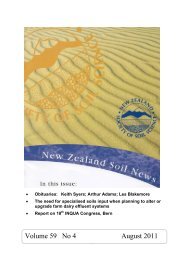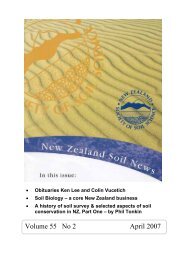Download - New Zealand Society of Soil Science
Download - New Zealand Society of Soil Science
Download - New Zealand Society of Soil Science
Create successful ePaper yourself
Turn your PDF publications into a flip-book with our unique Google optimized e-Paper software.
Managing Climate Change (MC2) Conference and two workshops (Carbon workshop and<br />
Modelling Workshop) (18-20 November 2009, Palmerston North, <strong>New</strong> <strong>Zealand</strong>).<br />
Landcare Research in collaboration with AgResearch, NIWA, GNS, Massey University, MAF and<br />
PGGRC, is organising the „Managing Climate Change‟ Conference and two workshops (Carbon<br />
workshop and Modelling Workshop), between 18-20 November 2009. The aims <strong>of</strong> the conference and<br />
the workshops are to begin a process <strong>of</strong> putting the information to manage greenhouse gas emissions<br />
in the hands <strong>of</strong> those who can use it to mitigate the climate change problem. A brief description is<br />
given below.<br />
i) Carbon workshop (funded by RSNZ) a half day session to update on current research/policy<br />
developments concerned with the carbon cycle at global and regional level. Topics will include<br />
atmospheric and oceanic CO2 observations, land use and other terrestrial inventory data, regional and<br />
global CO2 modelling, and an open discussion <strong>of</strong> approaches to integrate this information and<br />
strengthen research collaborations across research institutes and with interested policy analysts. The<br />
session has been sponsored by the Royal <strong>Society</strong> <strong>of</strong> <strong>New</strong> <strong>Zealand</strong> through the International<br />
Geosphere-Biosphere (Global Change) Committee.<br />
ii) Process-based models workshop (funded by LEARN/MAF) another half day LEARN/MAF funded<br />
will focus on process-based models (such as Denitrification-Decomposition, DNDC; DayCent) that<br />
simulate greenhouse gas fluxes from terrestrial ecosystems. This workshop aim is to train the<br />
researchers on the use and application <strong>of</strong> such models, to assess the models based on site scale<br />
validations with statistical tools for applications at regional or national scale, and to identify the<br />
modelling issues and challenges. Discussion will include issues around the development, testing and<br />
scaling-up <strong>of</strong> these models, building a standardised global database collected from experimental sites<br />
for site scale model assessments The overall theme <strong>of</strong> the conference is Managing Climate Change<br />
(MC2) with a focus on 'Processes, measurement, modelling and mitigation <strong>of</strong> greenhouse gases" as<br />
outlined below.<br />
The conference (with confirmed sponsorship from AgMardt) will highlight comprehensive<br />
understanding <strong>of</strong> how land-use change and management affects emissions <strong>of</strong> these gases from the<br />
land to the atmosphere at a range <strong>of</strong> spatial and temporal scales. Improving national inventories and<br />
developing mitigation policies to curb GHG emissions requires the best possible quantitative<br />
information (including uncertainties) on the processes controlling the exchanges <strong>of</strong> carbon dioxide<br />
(CO 2 ), methane (CH 4 ) and nitrous oxide (N 2 O) between the land and atmosphere. Effective<br />
technologies and management practices to reduce GHG emissions are being devised, implemented<br />
and refined. Process-based models are being developed to simulate <strong>of</strong> GHG emissions at a range <strong>of</strong><br />
scales up to national or global level, and to explore potential mitigation strategies. Key challenges<br />
include building understanding that remains valid at the scale <strong>of</strong> processes (plant to paddock) as well<br />
as national inventories, and remains relevant to emissions measured over hours or days as well as<br />
soil carbon changes measured over decades.<br />
About 70 conference presentations will cover the following themes:<br />
1. Policy-<strong>Science</strong> Interface - Translating science into effective policies. Inventory methods.<br />
Emissions “Carbon” trading and international issues.<br />
2. GHG Emission processes and GHG Measurements - Global warming & atmospheric<br />
processes. Understanding the underlying processes that lead to GHG emissions. Methods for<br />
measuring GHG emissions from global to laboratory scale.<br />
3. GHG Modelling - Process-based and empirical modelling methods from laboratory to global<br />
scale.<br />
4. <strong>Soil</strong> carbon dynamics - Controls on the storage and turnover <strong>of</strong> soil organic carbon.<br />
Sustaining and enhancing soil carbon. Integrating soil carbon models with GHG emissions.<br />
5. GHG Mitigation - Technologies and management practices that reduce GHG emissions and<br />
minimise the loss <strong>of</strong> valuable resources.<br />
Please visit the website for Registration, accommodation and related information.<br />
www.mc2conference.com<br />
184










